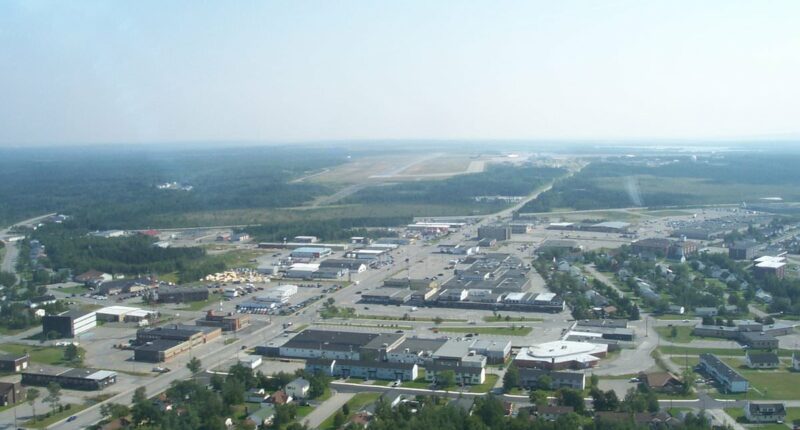Share this @internewscast.com
Twenty-four years ago this week, 2,977 lives were claimed when terrorists from al-Qaeda hijacked four commercial aircraft, crashing two into the Twin Towers of New York City’s World Trade Center. For the first and only time in US history, the nation’s airspace was completely closed in response to the horrors of September 11, 2001.

With over 4,000 planes in the air and no safe landing spot on US soil, air traffic controllers worked quickly to bring tens of thousands of passengers safely down. Within just a few hours, a total of 38 planes carrying nearly 7,000 passengers were rerouted to the small, remote town of Gander, Newfoundland, in Canada. What followed became one of history’s most inspiring tales of kindness, generosity, and human spirit – a story still powerful more than two decades later.

“I wouldn’t say it was a pleasant experience because the situation was terrible,” Gander Mayor Percy Farwell, who was deputy mayor during the attacks, told Daily Mail this week. “But there was a sense of refuge found here, which I think really helped relieve the tension, stress, fear, and worry we all felt,” he added. “What took place here serves as a model for how people should treat one another – with kindness and compassion. If that’s the legacy of what happened, it was worth every effort.”

The townspeople welcomed those they called the ‘plane people’, offering shelter, food, and clothing to strangers far from home, without knowing when they would return. “Residents emptied their closets and brought their own blankets,” Farwell explained. “There was a continual flow of food being delivered to the various spots where they were accommodated.” In the years since Gander became a symbol of hope during one of humanity’s darkest moments, the town has drawn thousands who want to see where the story truly took place. “It was a very interesting time and significantly boosted tourist numbers to Gander,” Farwell noted.

The community’s strong spirit and incredible response even inspired the hit Broadway musical, Come From Away, which tells how Gander turned a global tragedy into a deeply human story. “I think sharing this story gives people reassurance. In troubling times, there is light. When it seems hatred prevails, love conquers that,” Farwell said. “That’s why Gander’s story and the play’s message have a lasting impact. It wasn’t just the incident 25 years ago that inspired it; it’s that the message is as meaningful today as ever.” With a population of just 10,000 in 2001, 6,700 stranded passengers landed at Gander International Airport over five days, almost doubling the town’s size. Since then, Gander’s population has steadily increased, growing by over 20 percent by 2021. “The vibe in Gander is like a lively suburb,” Farwell explained. “We sometimes call ourselves a suburb of a city that doesn’t exist.’

With an international airport, a 400-seat theater regularly showcasing Come From Away, vibrant retail, and a major hospital, Gander today has evolved from the town where the ‘plane people’ first arrived. “It’s not a remote outpost that the term ‘remote’ might suggest,” Farwell stated. “We remain very much rooted in aviation. We have a college campus here that teaches aircraft maintenance engineering, with those trained being employed globally, well beyond Labrador,” he added. “Now, there’s a growing mining sector with a significant gold discovery right nearby.” In just the past three years, nearly 50,000 visitors have come to Gander to see Come From Away – something Farwell says has “transformed the community in that respect as well. When you look around and see all the division in the world, with hatred and violence, sometimes you need reassurance that the world isn’t entirely like that,” he said. “Those values exist and aren’t unique to Gander.” Mac Moss, a former administrator at the College of North Atlantic’s campus in Gander, recounted to Daily Mail how events unfolded in the town on 9/11.

Moss was working as usual that day until the college received a call from the Town Emergency Operations Center asking if the facility could accommodate some passengers – possibly overnight. ‘It was strange,’ Moss recalled, noting that no one really knew what was happening – only that something was very wrong. Gander’s emergency plan, created after a 1997 provincial mandate, kicked into gear on 9/11 – uniting the Red Cross, social services, hospital, RCMP, and Salvation Army in a coordinated town-wide response. A staggering 238 planes were rerouted to airports across Canada, with 38 landing in Gander – thanks to its vast runways, which have seen little use since World War II. It was an emergency, and we had no idea,’ Moss told Daily Mail. ‘But here we are in Gander, with 38 jumbo jets and not a thing wrong with the jets or the passengers.’

As the jet’s wheels touched down, residents rushed to welcome the ‘plane people’ and quickly came together to prepare for whatever the coming days would bring. Moss said: ‘We did our best, you know, to help them for as long as it took. We had all kinds of people from all walks of life here. We had language barriers to overcome,’ Farwell recalled. ‘We had all bands of our society here, and they all had to coexist. The chairman of Hugo Boss was here and was sleeping in a gymnasium next to someone who was certainly not a CEO of a major corporation,’ he added. Moss, on the other hand, recalled giving dozens of tight hugs to arriving passengers – offering immediate comfort in the face of the unknown. ‘People arrived here terrified and confused, and some had very direct connections to people that were involved in some of these sites in the US,’ Farwell told Daily Mail. ‘As time went by, the stress level came down and everybody realized that they’re in good hands.’

While Moss gathered his staff to organize preparations for hosting and feeding the hundreds of newcomers at the college, his wife reached out to friends and neighbors, rallying any available bedding. ‘I personally was on my feet for 72 hours, and only two hours sleep,’ Moss said. ‘I only went home to shower every now and then, and back to work.’ ‘The people who said, yes, we can accommodate, knew they would have to look after everything for all these people,’ he added. ‘It was unspoken, but it was understood.’ School bus drivers who had agreed to industrial action just weeks before dropped plans to picket and helped cart passengers from the airport to the town. Other residents helped transform schools, churches, community centers and even their homes into makeshift shelters for total strangers. The town even welcomed the passengers as ‘honorary Newfoundlanders’ through a local tradition called the ‘Screech-In,’ a lively ceremony celebrated with a shot of Newfoundland’s famous rum.

Moss, who was responsible for 438 stranded passengers at the college, recalled countless moments where people came together to adapt to the sudden crisis ‘basically flawlessly’ – stories he later detailed in his book. In the book, ‘Flown Into the Arms of Angels: Newfoundland and Labrador 9-11 Untold Stories and Unsung Heroes,’ Moss spoke of a German couple in desperate need of clean clothes. While a local helped clothe the woman, her husband – a towering 6-foot-8, 300-pound man – discovered that even another man’s jeans barely reached his knees as his own dirty clothes were being washed. ‘The host said to me afterwards, “That’s Newfoundland and Labradorians for you, my son. Not only did we give them the clothes off our back, we gave them the drawers and the shorts off our arses too,”‘ Moss recalled. One of the planes was rerouted to an intermediate school adjacent to the college, which became home to over 100 ‘Make a Wish’ children, or underprivileged kids from Manchester, England.

They had been on a special flight to fulfill their wish to visit Disney World in Florida – but, of course, their journey would come to an abrupt halt that day. ‘The staff dressed up in costumes and put on a big party for the kids. They had a ball, balloons, and clowns,’ Moss said. ‘There was a lot of entertainment.’ ‘There were also a number of entertainers that went venue to venue, just playing guitars and accordions and violins and fiddles and banjos, and went from place to place and played a few songs.’ Gander’s emergency system worked nearly impeccably on 9/11, despite typically being used for crashes and local crises in the years since WWII. ‘By 4.30 in the afternoon that first day, they had arranged accommodations for over 10,000 people,’ Moss said. ‘That’s just an absolutely amazing level of preparation.’ Days later, US airspace reopened to civilian flights – but with stricter regulations, marking a permanent shift in aviation and security as the world once knew it.

As thousands of passengers finally returned home to embrace their loved ones, the people of Gander were left quietly reeling – trying to make sense of the days they had just lived through. ‘The big thing, when it was all over, we were looking at each other and said, “What happened? What just happened?”’ Moss recalled. ‘It took awhile to get back to normal because you expect a door to open in a classroom and a group of strangers to walk out looking for food or looking for laundry, so it took awhile to get over that,’ he added. ‘Most of my staff reported the same thing, it’s almost like a type of PTSD, because you’re thrown into it. You had to make decisions on the spot, within a few minutes. And every decision had to be for the benefit of the passenger.’

Mayor Farwell agreed – amid all the chaos and distractions, it wasn’t until everyone had left that the weight of what had happened, both in their town and on US soil, truly began to sink in. ‘All of a sudden, it was like our town was a ghost town,’ Farwell said. ‘Our reward was the joy in those people as they left,’ he added. ‘Some of them were crying tears of joy as they left, because they were leaving their family now. Now we have a much broader recognition, and it’s for good. It’s not a notoriety. It’s that something good happened here in the middle of something very, very bad.’

Each year since the tragedy, Gander has held a somber memorial service that draws people from all around the world – whether attending in person where it all happened, or watching via livestream. But through the remembrance, Farwell is clear: each year is not a celebration, and certainly not one for their own actions. ‘We are remembering all those people who lost their lives and all their loved ones, and all the 10s of 1000s or hundreds of 1000s of people that were directly impacted by a horrible act of hate,’ he said. ‘If we’re celebrating anything, we’re celebrating bonds of friendship that formed out of the ashes.’









